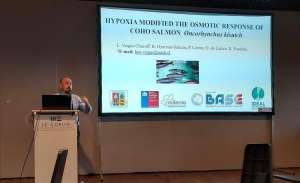Within the framework of the 14th version of the International Congress on Fish Biology, ICBF (International Congress on the Biology of Fish), Dr. Luis Vargas-Chacoff, Dr. Elie Poulin and doctoral researcher Daniela Nualart, traveled to the city of Montpellier to publish studies on the physiology and evolution of Antarctic fish.
The researchers from BASE Millennium Institute participated in the 14th International Congress on the Biology of Fish in France with their studies on the physiology and evolution of the Antarctic and sub-Antarctic fish, Harpagifer antarcticus. In the event, carried out in the city of Montpellier, from June 28th to July 1st, the relevance of the southern species for the food chain and the study of Climate Change was highlighted.
Dr. Luis Vargas-Chacoff, Researcher at the BASE Millennium Institute, Ideal Center, and academic at the Austral University of Chile, was part of the organizing committee of the congress, through the symposium on Ecology, Biology and Diversity of polar fish, where he presented Preliminary results of the study “Hypoxia and thermal effects on the osmoregulation of Antarctic fish Harpagifer antarcticus”. In addition, he presented researches related to the physiology of Atlantic salmon (Salmo salar) and coho salmon (Oncorhynchus kisutch), together with the doctoral researcher from the BASE Millennium Institute and the Austral University of Chile (UACh), Daniela Nualart.
At the same time, the Lead Researcher and Director of BASE Millennium Institute, Dr. Elie Poulin, participated in the polar fish symposium with the exhibition “Phylogeography, population genetics and adaptation of the Harpagifer (Nototheniidae) throughout the Southern Ocean”: “ I presented a collaborative work carried out by several BASE researchers on the phylogeography of an Antarctic and sub-Antarctic fish from the Southern Ocean, showing how environmental factors participate in the differentiation process of species, beyond the geographic isolation that may exist”, he pointed out.

On the other hand, Vargas-Chacoff expressed that the congress allowed them to show what is being done in Chile, and also to learn about the work of other colleagues. “These meetings also help us to see other points of view, hold meetings and talk to researchers from all over the world, with whom we have common interests”. Daniela Nualart added that it was possible to exchange information with different researchers and experts in fish biology and physiology. And that it was a unique experience where they could share with people who speak the same language of science and who share their experiences and results.
The ICBF is organized by the Physiology Section of the American Fisheries Society, in collaboration with a local organizing committee of fish physiologists from the Marine Biodiversity Exploitation and Conservation Center (MARBEC). The biannual international meetings began in 1994 in Canada, and have been established as an event that seeks to bring together the world community of researchers in the field of fish physiology.
By: Constanza Barrientos

